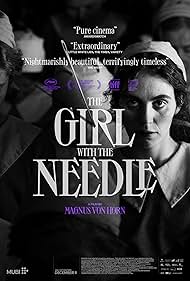Kasım 21, 2024



 12/16
12/16
He meets Dagmar, who runs an underground adoption agency
Story
Copenhagen 1919: A young worker finds himself unemployed and pregnant. A strong connection grows, but his world is shattered when he stumbles upon the shocking truth behind his work. Denmark’s official submission for the ‘Best International Feature Film’ category at the 97th Academy Awards in 2025. It’s the final days of the Great War and Karoline barely has time to work at the factory.
A lot happens during the film
She believes she is a widow because her husband disappeared during the war (although Denmark did not actually participate in it), but she does not receive widow’s benefits because he is not listed as dead. and I don’t want to go into spoilers, so I won’t go into the plot, except that the marketing highlights something that doesn’t play as big a role in the film as one might expect. Although it gets a lot of attention in the latter half of the film, for me the real value of the film is the sense of reality surrounding Karoline’s story. When was the last time someone in a movie tried to get a potential tenant to take an apartment by telling them they could get running water for two hours a day (from ten to noon, which might not be a big sell since most people would be working during those hours)?
When was the rampant drug use of the era portrayed so openly?
Even what Dagmar does was relatively common back then, although I would venture to guess that the trend is on the decline at the moment, and it doesn’t happen as much as it used to. I actually might have enjoyed the movie more if the marketing had been different and Dagmar wasn’t brought up because it set expectations. While Dagmar is an important character, the movie is clearly about Karoline and her struggles. On the other hand, it’s hard to say how I would have felt seeing the name Dagmar Overby on the door if I hadn’t known in advance that this real-life person was being used in the movie.
I like the look of the film
(It’s worth noting that the film is inspired by real-life events rather than based on them, so they try to maintain a certain distance from the real Dagmar.) I feel like some viewers will have a hard time sympathizing with Karoline, because she sometimes seems to make the right decision a little too late. At the same time, there’s not as much time or opportunity for ethics when you’re just trying to survive in a world where the odds are stacked against you. On the other hand, even though we know that the hope she’s given would be futile in this world, we still understand why she gives it to him. It’s in black and white, and the entire city looks run-down and barely standing.
Have things really changed that much?
It reminds us of the lack of interest in, or even contempt for, the well-being of working people. The time depicted took place over a hundred years ago, but the concept of a woman’s bodily autonomy is once again under constant attack. Of course, all art is in some way a mirror of the time in which it was made, but the similarities are easier to see here.




 12/16
12/16